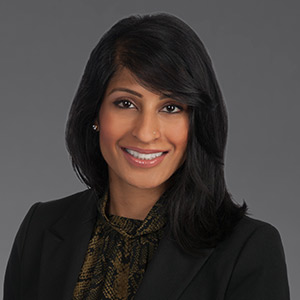
Geetha Adinata
Partner, FordHarrison
What you’d be surprised to know about me
I was diagnosed with breast cancer while I was in law school. I went on to graduate and have become a partner at FordHarrison, and am almost a 10-year survivor.
My Greatest Strength
Definitely, listening and communicating. The ability to listen helps me to really understand my clients’ unique business challenges and to ask the right questions, so I can get the information I need to develop creative, practical strategies.
When I started my career, I thought that clients needed to understand all of the technical legal regulations and analyses, but as I became more experienced, I realized that I could add more value to the client relationship, and be viewed as a true partner and extension of the client’s business, if I distilled the law into a practical steps and communicated sound, practical business strategies.
Also, as I manage a practice group, listening to my staff has helped me to be a better manager. I try to do monthly meetings with the staff, so I have my finger on what kinds of challenges they are having, which then allows me to alleviate any inefficiencies or bottlenecks, and manage client relationships. I also think it helps to engender a strong team culture. We are a small group, and I rely on the great staff that I have, so I invest in them, because I can only be as successful as the team’s joint effort.
Who Inspires Me
My parents truly are my heroes and a tremendous inspiration. Their work ethic and their attitude toward the seemingly insurmountable odds they faced when they immigrated to the U.S. in the 1970s have influenced me throughout my career. They immigrated to the U.S. when they were 24 and 21, respectively.
My dad grew up on a subsistence farm in rural India with six brothers and sisters. Therewere only enough resources to put the first two children through school, so my dad benefited from his birth order. He worked extremely hard, and he and my mother immigrated to the U.S. with a total of $8 in their pockets. I am humbled by the sacrifices they have made, leaving their families and the only culture they had ever known to travel halfway across the world just to give my sisters and me better opportunities than we as women may have had in India.
They faced racism and violence in the 1970s, yet stayed the course. My dad developed a successful medical practice in a town where they had never before seen an Indian person. My parents motivated me to work hard, really challenge myself, adapt to my circumstances no matter how hard things may have felt at times, and to distinguish things over which I have control and accept things over which I don’t.
Every day, I am motivated by their example and do not take for granted the opportunities I have been given. I will never have to work as hard as they did due to the sacrifices they made, which I will never have to make, and because of the opportunities those sacrifices afforded me.
The Model Minority Myth
I think the “model minority” myth has deeply affected the psyche of the Asian-American community in a number of ways. It is a stereotype that conjures positive characteristics like being hard-working, overachieving, and smart; getting good grades; excelling in science or math; becoming a professional with a good, stable job; and not “rocking the boat.”
On one hand, these can be very motivating to a community. On the other, I think this stereotype has also served to constrain the identity of the Asian-American population to a limited sphere, undermining the value of Asian-Americans who are brave enough to break the mold and forge their own paths. When I decided to go to law school, I got feedback from family and friends who asked, “Wouldn’t medicine be a better career?” I recall struggling with whether I had picked a lesser career path, because I didn’t become a doctor, and would I be less valued as a result.
I also think the “model minority” myth is a generalization that overshadows the unique needs of individual Asian populations in the U.S. For example, by setting a stereotype and expectation that Asian-Americans are a model population, Asian-American people who struggle economically and socially may not receive the attention they need to elevate themselves.
Lessons I’ve Learned
I’ve learned to recognize what I can control and what I can’t. When you pursue a career like law, you are Type A to some extent, and often find yourself trying to control everything, which is impossible. I try very hard to focus on doing great work and communicating with my clients and my peers, but letting go of unexpected circumstances, attitudes, or outcomes that were not within my control. I reflect and think about what made certain matters successful or unsuccessful, and try to implement the lessons I learn. I am much happier and feel less stress as a result.
My Best Career Advice
Manage expectations and communicate. By establishing good communication with your partners/associates and clients, you will develop trust and know what is expected of you by your company and your clients. School doesn’t really teach you about actually practicing law in any specific field, so it is essential that you communicate with those who delegate assignments about anything that is unclear and what you need specific guidance on. Also, keeping your clients apprised of developments in their cases and timelines will make them trust you and rely on your advice.






